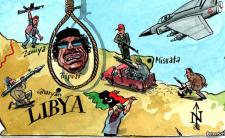Constitutional history
Originally home to a nomadic group of tribes called the Berbers, Libya has been invaded and colonized by several civilizations throughout its long history, including the Phoenicians, the Romans, the Greeks, and the Arabs who brought Islam to the area in the seventh century A.D. Tripoli was an independent city state profiting from trade with Mediterranean pirates from 1460 until it was captured by the Spanish in 1510. The Ottoman Turks took the city in 1551 and administered the surrounding area as two distinct provinces: the northwest region of Tripolitania and the northeast region of Cyrenaica. Italy took control of the area in 1912 after the Ottoman Empire was defeated, but the Islamic leader Muhammad Idris al Sanusi resisted their rule until he was recognized as the emir of Cyrenaica in 1917. The Italians established provincial parliaments and local advisory councils, but the fascist Italian regime filled many of these posts with sympathetic Italians. After World War II, the United Nations General Assembly declared that Libya should gain independence from the defeated Italians by 1 January 1952. A national constitution assembly drafted a constitution establishing a constitutional monarchy under Idris in 1950. This constitution was adopted in October 1951, and the new nation of the United Kingdom of Libya was formally declared 24 December 1951, making Libya the first nation to declare its independence under the auspices of the UN.
The constitutional monarchy came to an end on 1 September 1969 when a military coup removed Idris and established a twelve-member Revolutionary Command Council. This council, ruling the new declared Libyan Arab Republic, chose the newly promoted Colonel Muammar Abu Minyar al- Qadhafi as the Commander-in-Chief of the Armed Forces and de-facto head of state on 8 September, abolished the previous constitution, and issued a constitutional proclamation on 11 December that was to serve as the provisional governing document of the nation until a new constitution could be drafted. Under the auspices of this document, the country has been governed according to various declarations and the Green Book, published by Qadhafi, which combines the theories of nationalism, Islam, socialism, and populism. The 1977 declaration established the “authority of the people” based on these ideas, called the Third Universal Theory. This theory seeks to create a more unified national identity through direct rule by the people in a series of committees or Jamahiriya, the promotion of pan-Arab and pan-African causes, and the equalization of wealth. In March 1979, Colonel Qadhafi officially relinquished virtually all his government positions, taking the title Leader of the Revolution and Supreme Commander of the Armed Forces. However, the country continues to be governed by a small military elite, Qadhafi, and his family.
1969 Constitutional Proclamation and Declarations
The 1969 Constitutional Proclamation, established by the Revolutionary Command Council in the wake of their successful coup, was intended only to frame the general contours of Libya’s new government, and has since been modified and defined by Colonel Qadhafi’s Third Universal Theory through a series of declarations in 1975, 1977, and 1978. The original system of government established by the proclamation was headed by the Revolutionary Command Council. The Council had the power to promulgate laws and decrees, decide national policy, and make all decisions concerning national security. Under the Council were the President and the Council of Ministers, who were appointed and discharged by the Council. It was the duty of these Ministers to execute the national policies as formulated by the Council, as well as to prepare and study all laws, making recommendations to the Council where appropriate. The Council was also tasked with declaring war and ratifying treaties, though it could authorize the Ministers to do so. The Council alone, however, had the power to make decisions concerning martial law, states of emergency, and matters involving the Armed Forces. The proclamation also established an independent judiciary, open to all peoples equally, but it had no power of constitutional or institutional review.
Under the ensuing declarations, Colonel Qadhafi changed and refined this system to grant himself the powers of the Revolutionary Command Council and to reflect his ideological views. Under the 1977 declaration, Qadhafi was able to serve as the Secretary General for the newly created General Secretariat of the General People’s Congress, the putative legislative bodies. In this way, the Colonel was able to maintain his hold on the legislative powers of the Revolutionary Command Council, even as he nominally opened the door to a representative government. While he resigned this position in 1979, he remained the de facto ruler of the nation as the Supreme Commander of the Armed Forces and spiritual head of the revolution.
In his Green Book, Colonel Qadhafi insists that democracies are ultimately undemocratic because elected representatives are isolated from the masses and are elected by undemocratic procedures. In forming Libya’s new system of government and his Third Universal Theory, the Colonel sought to address this by creating a multi-tired, indirect legislative system. The lowest level of representation is the Basic People’s Congress. There are three of these Congresses, divided by region, and every citizen must be a member of their regional Congress. Within each of these are People’s Committees, chosen by the Congresses, which administer basic services. Also within the Congresses are the Professional Committees, which protect the interests and rights of specific professions. The People’s and Professional Committees meet in a national conference to form the main legislative body of Libya, the General People’s Congress. Members of this General Congress are chosen indirectly by the leaders of the Arab Socialist Union from the local Congresses and among other government leaders to declare wars, ratify treaties, and consider general government policy. The chair of the General Congress, chosen from within its ranks, also has the ability to accept the credentials of foreign ambassadors.
The 1979 declaration replaced the 1969 Proclamation’s Revolutionary Command Council with the General Secretariat of the General People’s Congress. Now the highest executive authority, the General Secretariat was composed of members from the former Revolutionary Command Council, and upon their death or resignation, new members are chosen by the General People’s Congress. Headed by Colonel Qadhafi as the Secretary General, it was the task of this body to oversee the functioning of the government and the execution of state policy. The Colonel is no longer the Secretary General and the titular Head of State, but he continues to exercise the same degree of influence of the body’s decisions. The General Secretariat is aided by the General Secretariat of the People’s Congress, renamed the General People’s Committee, which performs the tasks of the 1969 Proclamation’s Council of Ministers.
The court system was also elaborate upon in the declarations, as the 1969 Proclamation gave little direction as to its makeup or powers. In keeping with Colonel Qadhafi’s Green Book, all law in Libya is based on Islamic law as enumerated in the Koran. The highest appeals court of Libyia is the Supreme Court, whose members are appointed by the General People’s Congress. The Supreme Court is divided into 3 different chambers. The first deals with civil and commercial cases, the second with criminal, administrative, and constitutional cases, and the final with religious cases. However, there are also revolutionary and military courts which do not abide by procedural rules and judicial precedent as established by the constitutional system. These courts usually hear cases relating to crimes against the state and political offenses, and have become a tool of the military government to try political opponents without judicial and constitutional protections. In 2004, Colonel Qadhafi allowed Amnesty International to review the judicial system seeking international and economic benefits, and in a gesture of reform, he declared that these practices would be abolished and normal criminal procedures followed on all judicial levels.
The Draft Interim Constitution of 2011
In 2011, following the over throw and death of Colonel Qadhafi as a result of the Libyan revolution which had started in February 2011, the National Transitional Council(NTC), which led the revolution against the Qadhafi regime published a draft interim constitution which is to govern the country until elections and a permanent constitution is established. Under the Interim Charter, the NTC functions as an interim executive with its president having the power to form an interim national government. While the charter does not specifically establish any state institutions, it does provide that “judicial authority” shall be exercised by the courts of justice and makes the NTC the supreme authority, including authority to legislate for the duration of the transition.
Timeline
| 1460 | Tripoli becomes independent city state and have for Mediterranean pirates |
| 1510 | Spanish capture Tripoli and establish colony |
| 1551 | Ottoman Turks capture Libya from the Spanish |
| 1912 | Italy takes control of Libya |
| 1917 | Italians recognize resistance and Muslim leader Muhammad Idris al Sanusi as the emir of the north-eastern region of Cyrenaica |
| 1950 | National constitutional assembly drafts constitution establishing constitutional monarchy under Idris |
| 1951 | Constitution adopted and United Kingdom of Libya formally established |
| 1 September 1969 | Bloodless military coup, Colonel Muammar Abu Minyar al-Qadhafi declared Commander-in-Chief of the Armed forces and de-facto head of state, Constitutional Proclamation forms new system of government |
| 1977 | Constitutional declaration established government based on Qadhafi’s Third Universal Theory from his Green Book, combining the theories of socialism, nationalism, and populism with Islamic doctrine |
| March 1979 | Colonel Qadhafi relinquishes his government positions to take title of Leader of the Revolution and Supreme Commander of the Armed Forces, but remains de facto leader of government |
| February 2011 | Revolution and formation of the NTC |
| August 2011 | Publication of the draft interim Constitution of Libya |
Bibliography
| Branch | Hierarchy | Powers | Removal |
|---|





Share this article